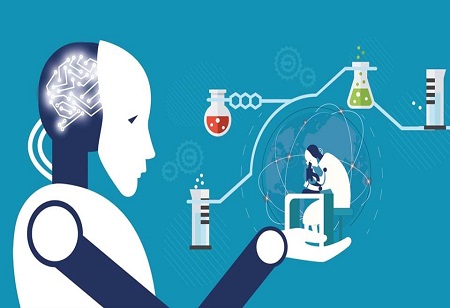Vishal Pratap Singh | Saturday, 02 April 2022

In the last one decade, people have witnessed the increasing sophistication of machine learning algorithms applied in daily use from internet searches, voice recognition, social network software to machine vision software in cameras, phones, self-driving cars and robots.
The latest machine learning algorithm which is garnering significant attention is Deep Learning which is an artificial neural network with multiple hidden layers. “Deep Learning algorithm is transforming patient care and can play a fundamental role in pharmaceutical research in these uncertain times”, says Sundar Pichai, CEO, Google.
The Deep Learning market was worth USD 2.28 billion in 2017 and is expected to reach USD 18.16 billion by 2024, at a CAGR of 41.7 per cent from 2018 to 2024.
Mental Health Chatbots
The use of artificial intelligence based mental health apps such as Happify, Moodkit, Woebot, Wysa including chatbots is increasing. Some of these chatbots can leverage deep learning models for more realistic conversations with patients.
Recently, a study conducted by Stanford University showed that an intelligent conversational agent can significantly decrease depression and anxiety symptoms in students and it is an efficient and engaging way to deliver mental health support to patients.
Helps to Deliver Personalised Medical Treatment
Deep Learning solutions are known to allow healthcare organisations to deliver personalised patient care by analysing patients’ medical history, symptoms and tests.
Also, Natural Language Processing (NLP) provides insights from free text medical information for most relevant medical treatments. Deep learning models can audit prescriptions and the record of patients’ health to identify and correct possible diagnostic errors or errors in prescription.
Mental Health Research
Most of the researchers across the globe are trying to improve clinical practice in mental health by using deep learning models. For example, there are ongoing academic studies about understanding the effects of mental illness and other disorders on the brain by using deep neutral networks.
Researchers say that trained deep learning models can provide better results in some areas compared to standard machine learning models. For example, deep learning algorithms can learn to determine meaningful brain biomarkers.
Helpful in COVID-19
Deep Learning models has gained huge importance with the global COVID-19 outbreak. Many researchers have started to study deep learning applications for early detection of COVID-19, predicting intensive care unit admission, helping to find potential patients who have high risk for COVID-19 and estimating need for mechanical ventilation.
Genomics Analysis
Deep Learning models increase interpretability and provide a better understanding of biological data. Usually the complex data analysing capabilities of deep learning models support scientists while they study the interpretation of genetic variation and genome based therapeutic development.
CNNs are commonly used and they enable scientists to get attributes from fixed size DNA sequence windows.
Helps in Drug Discovery
Deep learning model has contributed in the discovery and prediction of drugs has been growing with new technological advances. Deep learning algorithms are able to identify viable drug combinations by processing genomic, clinical and population data rapidly.
Many researchers in the pharmaceutical industry take advantage of deep learning toolkits to focus on patterns in these large data sets.
Medical Imaging
Image recognition and object detection are used in Magnetic Resonance (MR) and Computed Tomography (CT) processes for image segmentation, disease detection and prediction.
Deep Learning models are used to make effective interpretations by the combination of aspects of imaging data like tissue size, volume and shape. Usually, these models can flag important areas in images.
Deep learning algorithms are used for diabetic retinopathy detection, early detection of Alzheimer and ultrasound detection of breast nodules. As Deep Learning keeps on becoming advanced, most pathology and radiology images can be investigated in the future without any problem.
Simplifies Complex Data
Industry experts also say that Deep Learning algorithms can simplify complex data analysis, so abnormalities are determined and prioritized more precisely.
The insights that convolutional Neural Networks (CNNs) provide, help medical professionals to notice the health issues of their patients on time and more accurately.
Healthcare Data Analytics
Deep learning models can analyse electronic health records (HER) that contain structured and unstructured data, including clinical notes, laboratory test results, diagnosis and medications and exceptional speeds with the most possible accuracy.
Also, smartphones and wearable devices provide useful information about the lifestyle of individuals. They have the potential to transform data by using mobile apps to monitor medical risk factors for deep learning.
In the year 2019, current health’s AI wearable device became one of the first AI medical monitoring wearables approved by Food and Drug Administration (FDA) for use at home.
This device can be used to measure the pulse, respiration, oxygen saturation, temperature and mobility of patients.
Future Expectations
The deep learning computer vision approach to pharmaceutical research can be expected to have a major influence on big pharmaceutical companies and healthcare in general. Experts predict that soon this influence can be seen in the development of new treatments for pervasive diseases including modern lifestyle diseases like heart attack and diabetes. It also provides much needed progress in treating diseases which have fallen by the wayside until now.